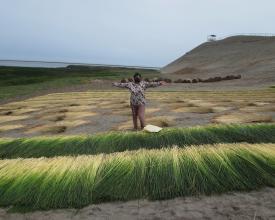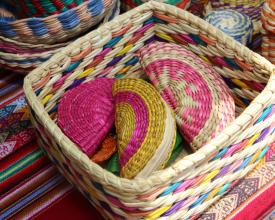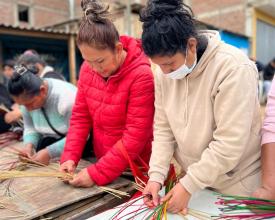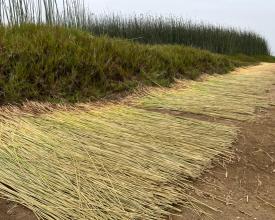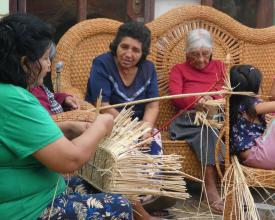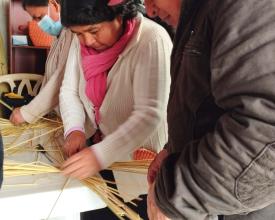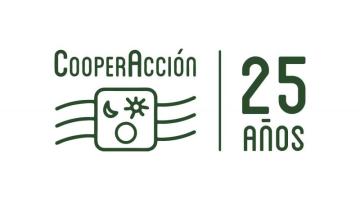
ESCUELABE: With art and tradition in their hands, women conserve Lima's coastal wetlands
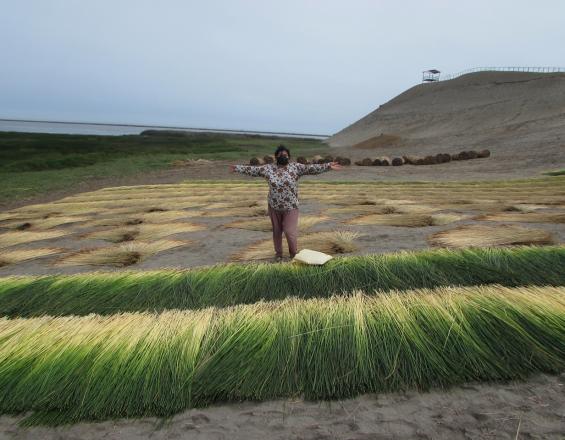
The artisans of Albuferas de Medio Mundo and El Paraíso (Lima region) are women committed to the conservation of coastal wetlands. Their capacities are strenghtened through the "ESCUELABE: Marine coastal schools for ecosystem-based adaptation", which is implemented by the German development cooperation (EbAMar project) with NGO CooperAcción.
Under the idea: "climate change is affecting wetlands and without them, there is no reed and no economic opportunities", women conserve and make use of wetlands in a sustainable manner. So far, 95 women have strengthened their identity with this ecosystem and their importance in facing climate change.
Contexte
Challenges addressed
The "Women's Artisan School" began its implementation during the COVID-19 pandemic. It did so in the midst of a complicated economic and social context due to the restrictions imposed by the Peruvian state.
Because of COVID-19, the trainings were conducted virtually. As a result, the artisan communities had to learn to use various platforms, thus strengthening their capacities in the use of digital technologies and the management of social networks.
In addition, the pandemic complicated the local context for artisans women, as they were burdened with more responsibilities associated with family care and domestic roles. For this reason, it was complicated to be able to participate continuously in the activities requested by the Women's Artisan School.
Emplacement
Traiter
Summary of the process
Strengthening the artisan women's self-esteem allowed them to gain more confidence in themselves, and consequently in their peers. This was an important aspect to work on, in order to achieve associativity in the context of climate change. Once the artisan women formed a partnership, they would have to start working together towards the same goal. Therefore, they have to develop a strategic planning with an EbA approach to conserve the wetlands, including aspects linked to climate change and the sustainable use of coastal marine ecosystems. In this way, the artisan women grouped under an association, understood that strategic planning is important, as it is the roadmap they will have to follow to achieve climate change adaptation, ecosystem protection, capacity building and the generation of new economic opportunities.
Building Blocks
Strengthening self-esteem
Strengthening women's self-esteem was used as a strategy to reach an understanding in the importance of climate change adaptation from the sustainable use of wetland ecosystem services. For that reason, it was necessary to keep the process of stregthening self-esteem in progress.
A strong self-esteem enables the development of self-confidence. Once self-confidence has been obtained, the process of trust building in others, continues. This is the basis for partnerships in the context of climate change. The strategy of promoting associativity and organisational strengthening took place at three levels: a) training, b) marketing, and c) adaptation.
Enabling factors
Important conditions for the success of the strategy were:
- Deepening trust-building towards each other
- Working on building trust towards institutions
- Fostering associativity among communities
- Strengthen capacities for the sustainable use of ecosystem services, and thereby achieve ecosystem-based adaptation to climate change.
Lesson learned
One lesson learned is that, difficulties in accessing services, that enable better living conditions, limit participation, associativity and the understanding of climate change as a threat and opportunity. In other words, the greater the poverty, the greater the difficulty in understanding climate change. For this reason, permanent face-to-face work was required. The strategy employed was: living with coastal communities of artisan women, strengthening their self-esteem through various workshops in the school.
Planning as a basic tool for organisation and adaptation
Parallel to the implementation of the school, the organisation's strategic planning process was carried out by incorporating the EbA approach, which included aspects related to climate change and the use of ecosystems. In both organisations, strategic and prospective visions were built, which took into account the scenarios that global warming will generate on the coast.
Enabling factors
It was essential to connect three concepts: ecosystem, women's fabric and markets. This connection is a multidimensional interrelationship that articulates the care of nature (wetland), the safeguarding of culture (women's weaving) and the use of economic opportunities (markets). This interrelationship would not be possible without the protection of the environment through good wetland behaviour. This means, good wetland management practices, based on the project's capacity building.
Lesson learned
Improved adaptation through capacity building, can turn climate change into an opportunity and open up a wider range of new alternatives for women. In order to achieve this understanding, it was important to produce didactic support materials and use panels in the training centers of both groups. This also included trips to the wetland to identify the key services that make the reed crafts possible. Adaptation to climate change is a dynamic process that involves a lot of memory, understanding and action.
Impacts
The "Women's Artisan School" has positively impacted artisan communities and wetlands:
- So far the School has trained 26 women in Medio Mundo, 28 in Paraíso, 17 in Huaral, 24 in Cañete, making a total of 95 women. Behind each artisan woman there are 5 people under her responsibility, meaning that the total number of beneficiaries is 475 people.
- It recognizes the importance of unifying women's organisations as one of the populations most vulnerable to climate change, due to their domestic roles and the burdens of motherhood. Women are essential as they possess the ancestral knowledge that enabled them to manage wetlands and therefore demonstrate that the ecosystem provides essential services to society.
- It has encouraged other women to become more involved in capacity building activities and join women's associations.
- It has facilitated access to new markets and economic opportunities.
- It has strengthened women's identity with their wetlands. The artisan women have a very strong connection with this ecosystem and see it from a maternal point of view, considering the "wetlands" as a female figure that provides opportunities.
- It has led to a better understanding of the importance of this ecosystem in addressing climate change in coastal marine areas.
Beneficiaries
So far, 95 women have been trained. However, the impact has been much greater, as behind each artisan woman, there are 5 people under her responsibility reaching a total of 475 people benefited.
Sustainable Development Goals
Story
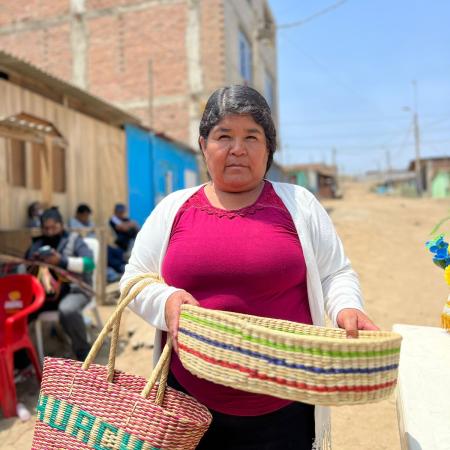
Vilma Rodriguez Cruz is a woman and master artisan woman who belongs to the Association of "Artesanas de Emprendedoras del Bicentenario" (AAREMBI). They are in charge of the conservation of the wetland "El Paraíso", an ecosystem located in the region of Huacho, Lima - Peru.
Vilma has been weaving for many years, a talent she discovered as a child when she used to weave with her mother. As she grew up, she became more and more passionate about the art of weaving. That was the reason why she joined different associations where she perfected her art.
Vilma has been a member of AAREMBI for 2 years. In the Association she has learnt to weave different stitches of reed fibre. She is currently working with the NGO CooperAcción, training artisanal fishermen and traders from the Asociación Movimiento Juvenil Pachacutano de Ventanilla, an association affected by the Repsol oil spill in the sea, in reed weaving.
In this way, Vilma, as a master artisan woman, helps to conserve the plant fibre extracted from the wetland and the tradition of reed weaving. She and her companions recognize that this material is indispensable for their livelihoods, which is why they are aware of the importance of conserving the wetlands.
